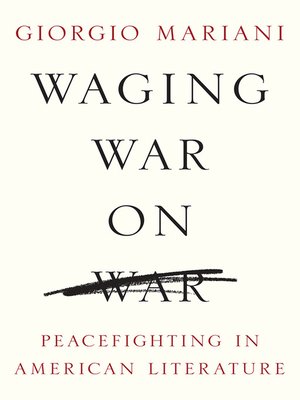Waging War on War
ebook ∣ Peacefighting in American Literature · Global Studies of the United States
By Giorgio Mariani

Sign up to save your library
With an OverDrive account, you can save your favorite libraries for at-a-glance information about availability. Find out more about OverDrive accounts.
Find this title in Libby, the library reading app by OverDrive.



Search for a digital library with this title
Title found at these libraries:
| Library Name | Distance |
|---|---|
| Loading... |
Giorgio Mariani rigorously engages with the essential question of what makes a text explicitly anti-war. Ranging from Emerson and Joel Barlow to Maxine Hong Kingston and Tim O'Brien, Waging War on War explores why sustained attempts at identifying the anti-war text's formal and philosophical features seem to always end at an impasse. Mariani moves a step beyond to construct a theoretical model that invites new inquiries into America's nonviolent, nonconformist tradition even as it challenges the ways we study U.S. warmaking and the cultural reactions to it. In the process, he shows how the ideal of nonviolence and a dislike of war have been significant, if nonhegemonic, features of American culture since the nation's early days.
Ambitious and nuanced, Waging War on War at last defines anti-war literature while exploring the genre's role in an assertive peacefighting project that offered—and still offers—alternatives to violence.
| Cover Title Contents Preface Acknowledgments Part I. Theory 1. Anti-War? Notes on a Ghostly Concept 2. Ad Bellum Purificandum: Giving Peace a Fighting Chance 3. The Rhetorical Equivalent of War: William James, Kenneth Burke, Stephen Crane Part II. Readings 4. An American Counter-Epic? War and Peace in Joel Barlow's Columbiad 5. "Cain's Ring": Moby-Dick and the Narrative of Sacrifice 6. "Curious Anesthetics": Ellen La Motte and the Wounds of the Great War 7. Waging War on the Sacred: William Faulkner's A Fable 8. War, Fiction, and Truth: Tim O'Brien's "How to Tell a True War Story" 9. Beyond the Semantic Netherworld: Literature and the Iraq War Notes Works Cited Index |"Waging War on War is a fascinating, learned, lively, and much-needed study of how different American writers and activists have imagined, defined, and fought for peace, even as they have gone to war or confronted the history of U.S. interventionism." —IMPACT"Giorgio Mariani's Waging War on War: Peacefighting in American Literature is a theoretically informed, refreshingly innovative perspective on the understudied genre of anti-war literature." —Leviathan: Journal of Melville Studies
"A rigorous examination of anti-war literature, and the result of decades of reading, writing and teaching."—Times Literary Supplement
|Giorgio Mariani is a professor of American literature at the Sapienza University of Rome. He is the author of Spectacular Narratives: Representations of Class and War in Stephen Crane and American Popular Literature of the 1890s.







